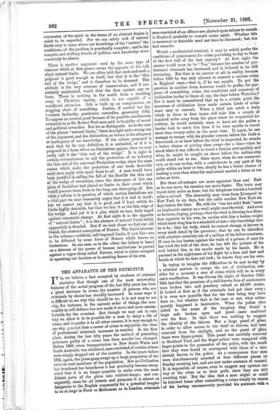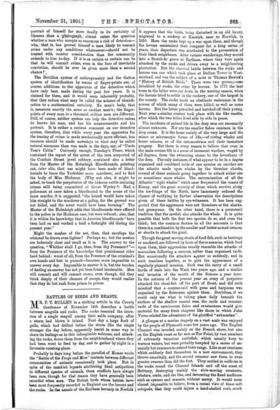. THE APPARATUS OF THE DETECTIVE.
IT is, we believe, a fact accepted by students of criminal statistics that though one of the most noteworthy features of the social progress of the last fifty years has been a great decrease in crime, the number of persons who are criminals by choice has steadily increased. In some ways it is difficult to see why this should be so; it is not easy to see why, for instance, in the natural order of things, the com- munity in self-defence has not made it more and more uncom- fortable for the criminal. But though we may ask in vain why, we allow it to be possible for a man to enjoy a life of crime, and to prefer it to all other careers, it is easy enough to see why, gi anted that a career of crime is enjoyable, the class of Professional criminals increases in number. In the first place, during the last fifty years the method of punishing prisoners guilty of a mime leas than murder has changed. Before 1850, when transportation to New South Wales and South Australia was abolished, men convicted of certain crimes were simply shipped out of the country. In the years before 1,835, again, the press-gang swept up a large proportion of the ne'er-do-weel members ef the population. But as Civilisation has broadened her boandaries it has gradually become recog- nised that it is no longer possible to make even the most &Stant parts' of the globe into rubbish-heaps ; and con- seouently, since for all intents and purposes it is almost as 44:igen:Ws to the English community for a potential burglar to be at large in Faris or Melbourne as in London, criminals
once convicted of an offence are allowed upon release to remain in England, probably to commit crime again. Whether this is necessary or desirable need not here be discussed; but the fact rema ins.
Would a professional criminal, it may be asked, prefer the conditions of punishment for crime prevailing to-day to thoSe of the first half of the last century ? At first sight the answer would seem to be " Yes," because the number of pro- fessional criminals has increased, and is believed to be still increasing. But that is no answer at all, in reality, because before 1850 he was only allowed to commit a serious crime in England once,—that is, if he was caught. To put .the question in another form, however, would he prefer, for pur- poses of committing crime, the conditions and resources. of civilisation to-day to those of, say, the days before Waterloo.? For it must be remembered that up to a certain point the resources of civilisation have made certain kinds of crinie more easy to commit. When a thief can catch a train which in three or four hours will take him a couple of hundred miles away from the place where he committed his robbery, he would certainly seem to have set the police a harder task to catch him than if he were unable to travel more than twenty miles in the same time. If, again, he can manage to escape with his plunder oversee, before the theft is discovered, or at least before the thief is suspected, he stands a better chance of getting clear away—for a time—than he stood when it was difficult to reach a foreign port quickly, and when he might be caught on shore before the sailing-ship could stand out to sea. Once more, when he can communi- cate, as he can to-day, with a confederate in any part of the globe within an hour or two, clearly he has a better chance of making a coup than when the mail-coach carried a letter at ten
miles an hour. .
But those advantages are more apparent than real.- Fast as he can move, his enemies can move faster. The train may travel sixty miles an hour, but the telephone travels a hundred miles a second. The steamship may cross from Liverpool to New York in six days, but the cable reaches New York six days before the liner. He, with his "too too solid flesh," races an implacable enemy as a snail might race the wind.- And even as he races, hoping, perhaps, that the wind is blowing ins direc- tion opposite to his own, he carries with him a leaden weight which must drag him to a standstill at last,---the knowledge that he is he; that his body, which he cannot change, is known in every stark detail by his- pursuers; that he can be identified with absolute certainty out of a million of his fellow-creatures. If once he has beaten against the walls of a prison, if once he has tried the bolt of the door, he has left the picture of his soul behind him in the marks made by his hands. He is pursued in the nightmare of his flight by a face and feet and hands at which he dare not look ; he knows they are his own.
In trying to imagine the difficulties to be met to-day 'by a criminal anxious to escape the net of civilisation, con- sider for a moment a case of crime which will be in every one's recollection. It was during the night of October 15th- 16th last that the premises of a well-known firm of auctioneers were broken into and jewellery valued at £5,000 stolen. It looked at first as if the criminals had got clear away ; it is even now possible that for the time being they have done so; but whether that is the case or not, what subse quently happened is instructive. When the police were ealled to the scene of the burglary they, found a large safe broken open and jewel - cases scattered over the floor. In that there was nothing to suggest the identity of the thieves. But a large panel of glass, in order to allow access to the thief or thieves, had been removed from the skylight, and on the- panel of glisa there were finger-prints. This panel was carefully removed to Scotland Yard, and the finger-prints were compared with finger-prints in the possession of the police, with • the 'result that they were found to correspond with those of a man already known to the police. As a consequence four Men were simultaneously arrested at four different 'places on Sunday morning last, and are now under sentence of remand. It is impossible. of course, even to suggest any opinion one way or the other as to their guilt, since 'they are still awaiting trial. ' But the idea that fi man ' might or could be followed home after committing a crime simply by reason of his ' having unconsciously provided his pursuers with a portrait of himself far more deadly in its certainty of likeness than a 4alaToto&aph, almost raises tjae question whether a man who accepts so enormous a risk of detection— who, that is, has proved himself a man likely to commit crime under any conditions whatsoever—should not be treated with scanter consideration than the community extends to him to-day. If it is as certain as certain can be that he will commit crime, even in the face of inevitable conviction, should he ever be given more than a second chance ?
The Bertillon system of anthropometry and the Galion system of identification by means of finger-prints are, of course, additions to the apparatus of the detective which have only been made during the past few years. It is claimed for them, and it would seem inherently probable, that they reduce what may be called the science of identifi- cation to a mathematical certainty. No man's body, that is, measures exactly the same as another man's ; the finger- prints of every man in a thousand million men are different. Still, of course, neither system can help the detective unless he knows his man, and has his measurements and his portrait. It is rather a curious comment on our detective system, therefore, that while every year the apparatus for the tracing of crime is made mechanically more efficient, less recourse should be made nowadays to what may be called natural resources than was made in the days, say, of "Uncle Tom's Cabin." Curiously enough, Tuesday's Times, which contained the report of the arrest of the men suspected of the Conduit Street jewel robbery, contained also a letter from the Master of the Holmleigh Bloodhounds, pointing out, inter alia, that use might have been made of blood- hounds to trace the Yorkshire moor murderer, and to find the body of Miss Hickman. (Why not also, it might be asked, to track the perpetrator of the hideous cattle-maiming crimes still being committed at Great Wyrley ?) Had a policeman at once taken a bloodhound to the scene of the moor murder, it is suggested, "the hound would have taken him straight to the murderer at a gallop, for the ground was not foiled, and the scent would have been burning." The Vaster of the Holmleigh adds that bloodhounds were offered to the police in the Hickman case, but were refused ; also, that it is within his knowledge that in America bloodhounds "have been laid on and worked a trail a fortnight old during the present year."
Might the meshes of the net, then, that envelops the criminal be drawn even tighter ? Perhaps so ; but the meshes are hideously close and small as it is. The answer to the question, "Whither shall I go, then, from thy Presence ?"— from the Presence of the knowledge that punishment rides hard behind: worst of all, from the Presence of the criminal's own hands and feet in pursuit—becomes more impossible to answer every day. Impossible to answer it is, but the burden of finding an answer has not yet been found intolerable. Men still commit and will commit crime, even though, did they think deeply of their chances of escape, they would realise that they do but rush from prison to prison.



























































 Previous page
Previous page